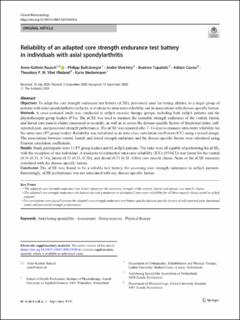Please use this identifier to cite or link to this item:
https://doi.org/10.21256/zhaw-20992Full metadata record
| DC Field | Value | Language |
|---|---|---|
| dc.contributor.author | Rausch, Anne-Kathrin | - |
| dc.contributor.author | Baltisberger, Philipp | - |
| dc.contributor.author | Meichtry, André | - |
| dc.contributor.author | Topalidis, Beatrice | - |
| dc.contributor.author | Ciurea, Adrian | - |
| dc.contributor.author | Vliet Vlieland, Theodora P. M. | - |
| dc.contributor.author | Niedermann, Karin | - |
| dc.date.accessioned | 2020-12-04T15:39:50Z | - |
| dc.date.available | 2020-12-04T15:39:50Z | - |
| dc.date.issued | 2020 | - |
| dc.identifier.issn | 0770-3198 | de_CH |
| dc.identifier.issn | 1434-9949 | de_CH |
| dc.identifier.uri | https://digitalcollection.zhaw.ch/handle/11475/20992 | - |
| dc.description.abstract | Objectives To adapt the core strength endurance test battery (aCSE), previously used for testing athletes, to a target group of patients with axial spondylarthritis (axSpA), to evaluate its intra-tester reliability and its associationswith disease-specific factors. Methods A cross-sectional study was conducted at axSpA exercise therapy groups, including both axSpA patients and the physiotherapist group leaders (PTs). The aCSE was used to measure the isometric strength endurance of the ventral, lateral, and dorsal core muscle chains (measured in seconds), as well as to assess the disease-specific factors of functional status, selfreported pain, and perceived strength performance. The aCSE was repeated after 7–14 days to measure intra-tester reliability for the same rater (PT group leader). Reliability was calculated as an intra-class correlation coefficient (ICC) using a nested design. The associations between ventral, lateral, and dorsal strength endurance and the disease-specific factors were calculated using Pearson correlation coefficients. Results Study participants were 13 PT group leaders and 62 axSpA patients. The latter were all capable of performing the aCSE, with the exception of one individual. A moderate to substantial intra-rater reliability (ICCs (95%CI)) was found for the ventral (0.54 (0.35, 0.74)), lateral (0.52 (0.33, 0.70)), and dorsal (0.71 (0.58, 0.86)) core muscle chains. None of the aCSE measures correlated with the disease-specific factors. Conclusion The aCSE was found to be a reliable test battery for assessing core strength endurance in axSpA patients. Interestingly, aCSE performance was not associated with any disease-specific factors. | de_CH |
| dc.language.iso | en | de_CH |
| dc.publisher | Springer | de_CH |
| dc.relation.ispartof | Clinical Rheumatology | de_CH |
| dc.rights | http://creativecommons.org/licenses/by/4.0/ | de_CH |
| dc.subject | Ankylosing spondylitis | de_CH |
| dc.subject | Assessment | de_CH |
| dc.subject | Group exercise | de_CH |
| dc.subject | Physical therapy | de_CH |
| dc.subject.ddc | 615.82: Physiotherapie | de_CH |
| dc.subject.ddc | 616.7: Krankheiten des Bewegungsapparates und Orthopädie | de_CH |
| dc.title | Reliability of an adapted core strength endurance test battery in individuals with axial spondylarthritis | de_CH |
| dc.type | Beitrag in wissenschaftlicher Zeitschrift | de_CH |
| dcterms.type | Text | de_CH |
| zhaw.departement | Gesundheit | de_CH |
| zhaw.organisationalunit | Institut für Physiotherapie (IPT) | de_CH |
| dc.identifier.doi | 10.1007/s10067-020-05408-6 | de_CH |
| dc.identifier.doi | 10.21256/zhaw-20992 | - |
| zhaw.funding.eu | No | de_CH |
| zhaw.issue | 4 | de_CH |
| zhaw.originated.zhaw | Yes | de_CH |
| zhaw.pages.end | 1360 | de_CH |
| zhaw.pages.start | 1353 | de_CH |
| zhaw.publication.status | publishedVersion | de_CH |
| zhaw.volume | 40 | de_CH |
| zhaw.publication.review | Peer review (Publikation) | de_CH |
| zhaw.webfeed | ZHAW digital | de_CH |
| zhaw.funding.zhaw | Etablierung der internationalen Bewegungsempfehlungen für Rheuma-Betroffene in den Bechterew-Bewegungsgruppen | de_CH |
| zhaw.author.additional | No | de_CH |
| zhaw.display.portrait | Yes | de_CH |
| Appears in collections: | Publikationen Gesundheit | |
Files in This Item:
| File | Description | Size | Format | |
|---|---|---|---|---|
| 2020_Rausch-etal_Reliability-core-strength-endurance-test-battery.pdf | 291.71 kB | Adobe PDF |  View/Open |
Show simple item record
Rausch, A.-K., Baltisberger, P., Meichtry, A., Topalidis, B., Ciurea, A., Vliet Vlieland, T. P. M., & Niedermann, K. (2020). Reliability of an adapted core strength endurance test battery in individuals with axial spondylarthritis. Clinical Rheumatology, 40(4), 1353–1360. https://doi.org/10.1007/s10067-020-05408-6
Rausch, A.-K. et al. (2020) ‘Reliability of an adapted core strength endurance test battery in individuals with axial spondylarthritis’, Clinical Rheumatology, 40(4), pp. 1353–1360. Available at: https://doi.org/10.1007/s10067-020-05408-6.
A.-K. Rausch et al., “Reliability of an adapted core strength endurance test battery in individuals with axial spondylarthritis,” Clinical Rheumatology, vol. 40, no. 4, pp. 1353–1360, 2020, doi: 10.1007/s10067-020-05408-6.
RAUSCH, Anne-Kathrin, Philipp BALTISBERGER, André MEICHTRY, Beatrice TOPALIDIS, Adrian CIUREA, Theodora P. M. VLIET VLIELAND und Karin NIEDERMANN, 2020. Reliability of an adapted core strength endurance test battery in individuals with axial spondylarthritis. Clinical Rheumatology. 2020. Bd. 40, Nr. 4, S. 1353–1360. DOI 10.1007/s10067-020-05408-6
Rausch, Anne-Kathrin, Philipp Baltisberger, André Meichtry, Beatrice Topalidis, Adrian Ciurea, Theodora P. M. Vliet Vlieland, and Karin Niedermann. 2020. “Reliability of an Adapted Core Strength Endurance Test Battery in Individuals with Axial Spondylarthritis.” Clinical Rheumatology 40 (4): 1353–60. https://doi.org/10.1007/s10067-020-05408-6.
Rausch, Anne-Kathrin, et al. “Reliability of an Adapted Core Strength Endurance Test Battery in Individuals with Axial Spondylarthritis.” Clinical Rheumatology, vol. 40, no. 4, 2020, pp. 1353–60, https://doi.org/10.1007/s10067-020-05408-6.
Items in DSpace are protected by copyright, with all rights reserved, unless otherwise indicated.